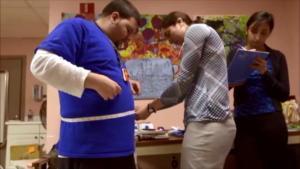From 1959 to Today, Workers Still Need Paid Leave
By Robin Shaffert, Senior Executive Officer, Individual and Family Support, The Arc
 Among my grandmother’s papers was a letter dated May 28, 1959, from her employer, the New York retailer Franklin Simon, informing her, “Due to the fact that your illness will be prolonged over a period of time, we have been forced to replace you at this time.”
Among my grandmother’s papers was a letter dated May 28, 1959, from her employer, the New York retailer Franklin Simon, informing her, “Due to the fact that your illness will be prolonged over a period of time, we have been forced to replace you at this time.”
“However,” the letter continues, “[W]e wish to let you know that your record with us has been good, and we will be happy to consider you for an opening when you are able to return to work again.” She received “two weeks vacation salary which is due you,” but no sick leave or notice pay.
I was shocked. My grandmother had been fired because she needed surgery. When I found the letter a few years ago, the Family and Medical Leave Act had been the law for almost 20 years. Large employers like Franklin Simon couldn’t just fire employees when they needed time off for medical care. Or, at least, they couldn’t fire many of their full time employees.
Born in Austria-Hungary in 1900, my grandmother came to this country with her husband and her son as a refugee from the Nazis in 1940. A housewife in Vienna, here she worked first in a factory sewing clothes for dolls and later as a saleswoman at Franklin Simon.
By 1959, my grandmother was living alone in a fourth floor walk-up in the Bronx. Her husband had died, and her only son was married and had a new baby. I don’t know what financial hardship my grandmother endured when she lost her job. As far as I know, she never reentered the workforce.
Being able to take time off from work for my own medical care, after the birth of my children, and to care for my parents and my sister who had congenital heart disease is only one of the many ways that life has been easier for me than it was for my grandmother. But even today many people can still be fired if they need to take time off from work. And, for many unpaid leave is an empty promise because they simply can’t afford to take time off without pay.
At The Arc, our mission is to promote and protect the human rights of people with intellectual and developmental disabilities (IDD) and actively support their full inclusion and participation in the community throughout their lifetimes. People with disabilities and their family members are an important part of the American workforce, and like all working people, they need access to paid leave. In my work, leading the Center for Future Planning®, I focus on the needs of the over 800,000 families in which adults with IDD live with aging caregivers 60 and over. As these parents age and continue to support their sons and daughters to build full and independent lives, the need for flexibility can be critical.
We are joining the call for a robust federal paid family and medical leave law that adheres to a core set of principles. All employees (regardless of the size of the employer, length of service, and number of hours worked) must be able to access paid leave of meaningful length. People need to take leave for different reasons, and all employees should be able to access paid leave for the full range of personal medical and family caregiving needs established in the Family and Medical Leave Act. Families come in many shapes and sizes, so “family” must be inclusively defined. We must design a program that is affordable and cost-effective for workers, employers, and the government. Finally, we must ensure that people who take the leave do not experience adverse employment consequences as a result.
In the disability community, we know how important it is to celebrate one another in good times and to provide support in harder times. An inclusive and robust paid family leave program is an important building block of that support.


 Brian Armour, PhD is an economist with the Centers for Disease Control and Prevention (CDC). He has spent over 15 years in health services research, including work on helping design the
Brian Armour, PhD is an economist with the Centers for Disease Control and Prevention (CDC). He has spent over 15 years in health services research, including work on helping design the 






